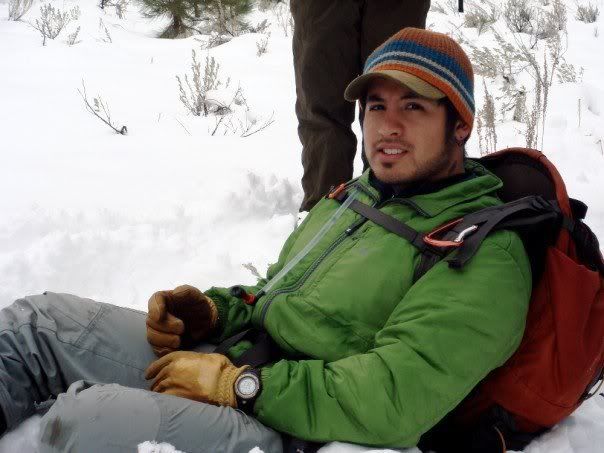"This isn't what we meant."
Last week, I spent two days in Bethlehem on a program with Encounter, which provides brief experiences for Jewish leaders in Bethlehem, Hebron and East Jerusalem. As it was quite an interesting, thought-provoking experience, I've been meaning to write a lengthy post on my experience for the past week, but being crazy busy haven't found time for an adequate update. But, since I'm leaving early tomorrow morning for a visit with sister Shayna to Beirut (!!) I'll share a few thoughts generated by the experience before I finish packing and prepping tonight.
First off, Encounter is not meant to be a "dialogue" program, in that rather than coming together with Palestinians to discuss thoughts and perspectives from both sides of the issue, the goal is to meet and listen to Palestinians living in Bethlehem, and see a (granted, tiny) slice of the Palestinian experience. In essence, to have an Encounter. (Elliot and I with our gracious host, Osama)
(Elliot and I with our gracious host, Osama)
Bethlehem is mainly a Christian city. As such, nearly all the Palestinians we met are Christian. On the one hand, this is certainly a narrow and limiting perspective on the issue, since most Palestinians are of course Muslim, and there are undeniably religious components to the conflict. That said, listening to the perspectives of life in a Christian Palestinian town - where ties to the Palestinian issue are cultural and ethnic, but not religious per se - underscored that as much as the conflict has roots in religious conflict, it also a conflict of nationalist identity on both sides. On the Palestinian side, it is greatly about the desire for channeling nationalist Palestinian identity into a tangible, physical state. On the Jewish/Israeli side, occupation and the inherent problems stem not only from religious connections to the land of Israel, but also from Zionist-nationalist desires.
The question that has remained in the background of so many of our experiences and learning this year thus returns: What does it mean for Israel to be a Jewish state? How is this reflected (or not) in the policies and actions of the state, and how should Judaism as a religious code and ethic come into play in determining our actions and attempting to fix the incessant problems in Israeli society?
Continuing with the internal thought process of Jewish religious identity versus nationalist identity also returned me to this question: In our long history, Jews have had a dual identity as wanderers (in the desert, in exile in Babylonia and then throughout the Diaspora) and as permanent citizens of the physical land of Israel. A hallmark of the Jewish experience has been our ability to build community wherever in the world we have gone - Sukkot is partially a shout-out to this ability, as is the entire Rabbinic tradition born out of exile as we transformed Judaism from a religion based on Temple rites to one based on prayer and halakha.
[I should note here that when I discussed this thought with Naamah, another Dorot fellow, she made the excellent point that even during our wanderings, our thoughts and hopes revolved around our pining for Jerusalem, our longing to return to "our" land, a land promised to us. This is as much a hallmark of Judaism as is our existence wandering in exile.]
Looking to the times in our history when we've held nationalist power - e.g. the kingdoms of Judea and Samaria, Jerusalem under King Herod and the Hasmonean Kings - and we've been subject to the same hypocritical, corrupt tendencies that have befallen just about any and every sovereign ruling power.
The same can be said today. In building the state of Israel, there has constantly been this tension between religious and nationalist identity. And for all the idealistic underpinnings of the state, from the kibbutz movement to "making the desert bloom" (although that one has questionable motives even so) Israel suffers from the same birthing problems of any other sovereign state (underscored again today during our Dorot seminar on Bedouin peoples in Israel, a situation for which the parallels to US treatment of Native American populations is terrifying).
At the heart of it, and the question that was by far most difficult was this: Given the problems of sovereignty in Israel and throughout our history, is nationalism corroding modern Judaism? We may quickly be reaching the point of no return in the Israel-Palestine question (if we haven't already), wherein a two-state solution is no longer feasible. And there are many differences of opinion as to what this means for Israel as a state - but none of them are particularly optimistic.
Continually, from the serious environmental problems to "solutions" for the Bedouin peoples' land claims to the erecting of the security wall (particularly its route...but there isn't near enough space to go into that now), I am struck by the short-sightedness of the Israeli government's decisions and actions. The quick-fixes, band-aids quickly slapped onto deeply troubling problems, are not working and won't. Israel needs to consider it's larger future, or I fear that in 100 years (or less) Israel will have crumbled in on itself, and the dream will be over.
I'll end, for now, with perhaps the most powerful sentiment expressed during the Encounter experience. During our final session, the facilitator for our small group shared a conversation she'd had recently with a friend of hers, a 103 year old woman who has lived in the land of Israel since the 1930's. Looking back over the last century - the British Mandate, the founding of the state, and the extraordinary efforts to build Israel as a Jewish state - and considering the profound problems plaguing Israel today, the woman said:
"This isn't what we meant."


No comments:
Post a Comment